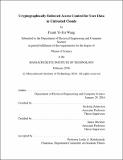Cryptographically enforced access control for user data in untrusted clouds
Author(s)
Wang, Frank Yi-Fei
DownloadFull printable version (683.6Kb)
Other Contributors
Massachusetts Institute of Technology. Department of Electrical Engineering and Computer Science.
Advisor
Nickolai Zeldovich and James Mickens.
Terms of use
Metadata
Show full item recordAbstract
Modern web services rob users of low-level control over cloud storage; a user's single logical data set is scattered across multiple storage silos whose access controls are set by the web services, not users. The result is that users lack the ultimate authority to determine how their data is shared with other web services. In this thesis, we introduce Sieve, a new architecture for selectively exposing user data to third party web services in a provably secure manner. Sieve starts with a user-centric storage model: each user uploads encrypted data to a single cloud store, and by default, only the user knows the decryption keys. Given this storage model, Sieve defines an infrastructure to support rich, legacy web applications. Using attribute-based encryption, Sieve allows users to define intuitive, understandable access policies that are cryptographically enforceable. Using key homomorphism, Sieve can re-encrypt user data on storage providers in situ, revoking decryption keys from web services without revealing new ones to the storage provider. Using secret sharing and two-factor authentication, Sieve protects against the loss of user devices like smartphones and laptops. The result is that users can enjoy rich, legacy web applications, while benefiting from cryptographically strong controls over what data the services can access.
Description
Thesis: S.M., Massachusetts Institute of Technology, Department of Electrical Engineering and Computer Science, 2016. This electronic version was submitted by the student author. The certified thesis is available in the Institute Archives and Special Collections. Cataloged from student-submitted PDF version of thesis. Includes bibliographical references (pages 55-60).
Date issued
2016Department
Massachusetts Institute of Technology. Department of Electrical Engineering and Computer SciencePublisher
Massachusetts Institute of Technology
Keywords
Electrical Engineering and Computer Science.